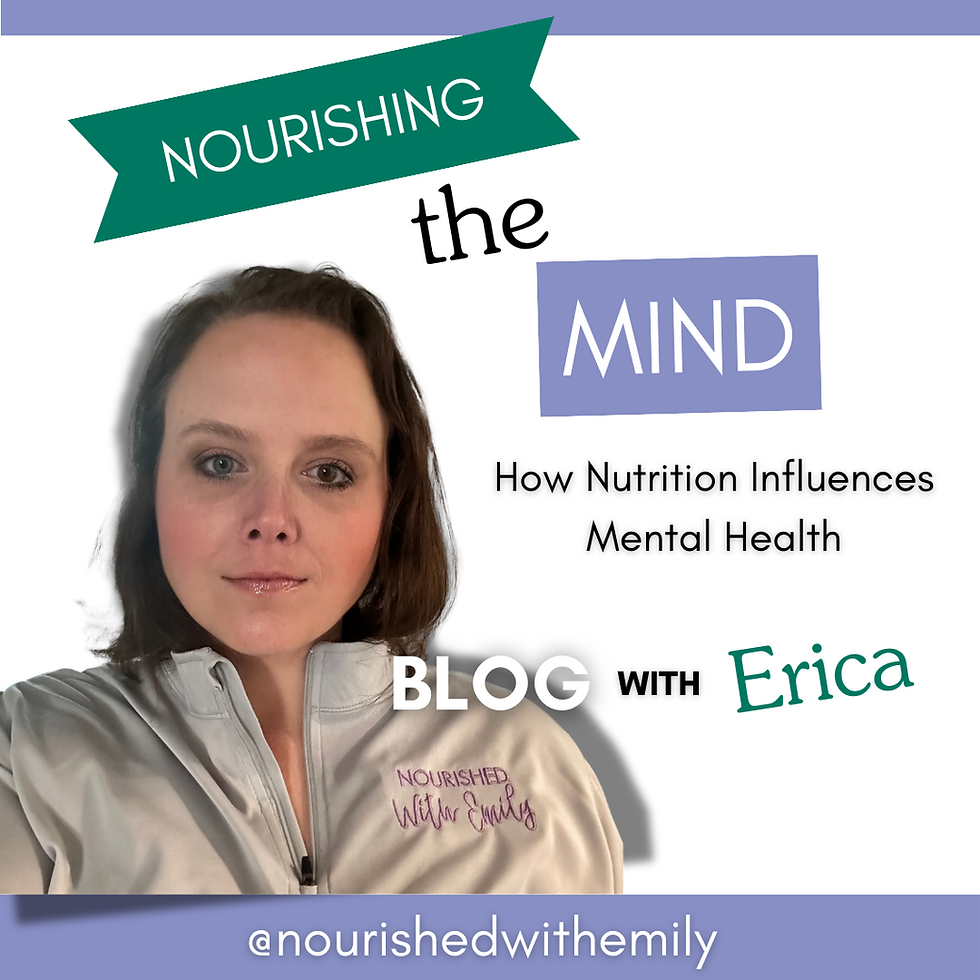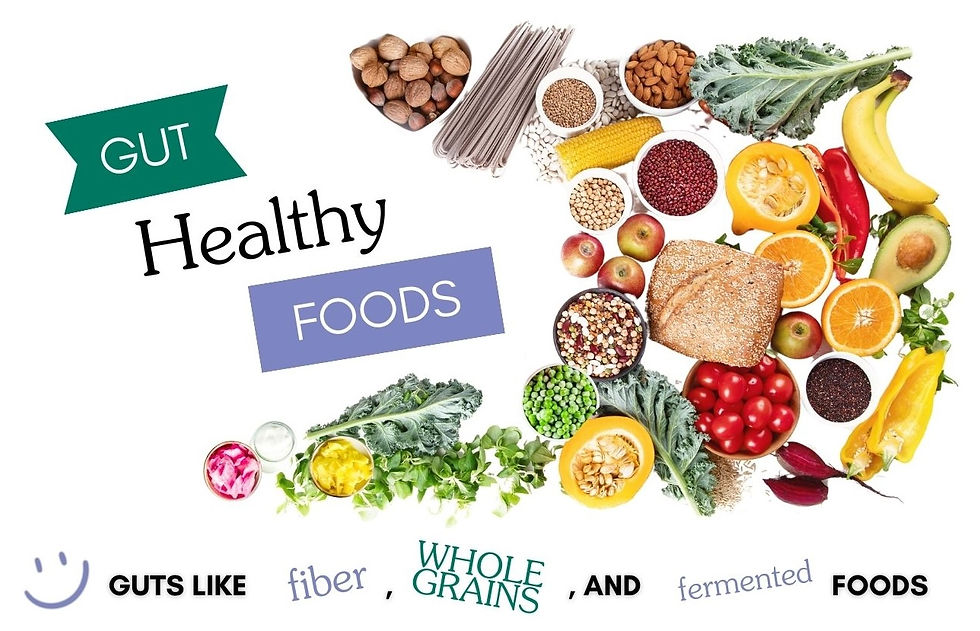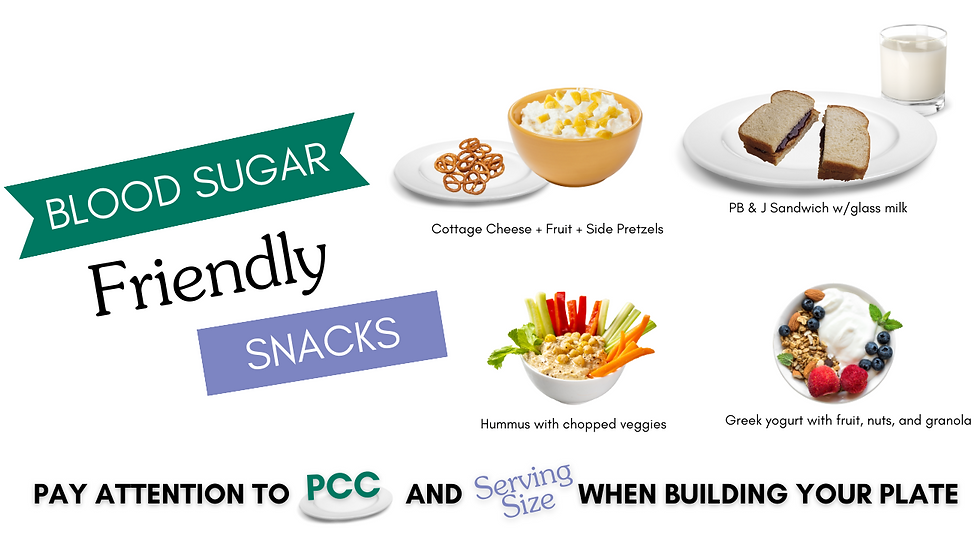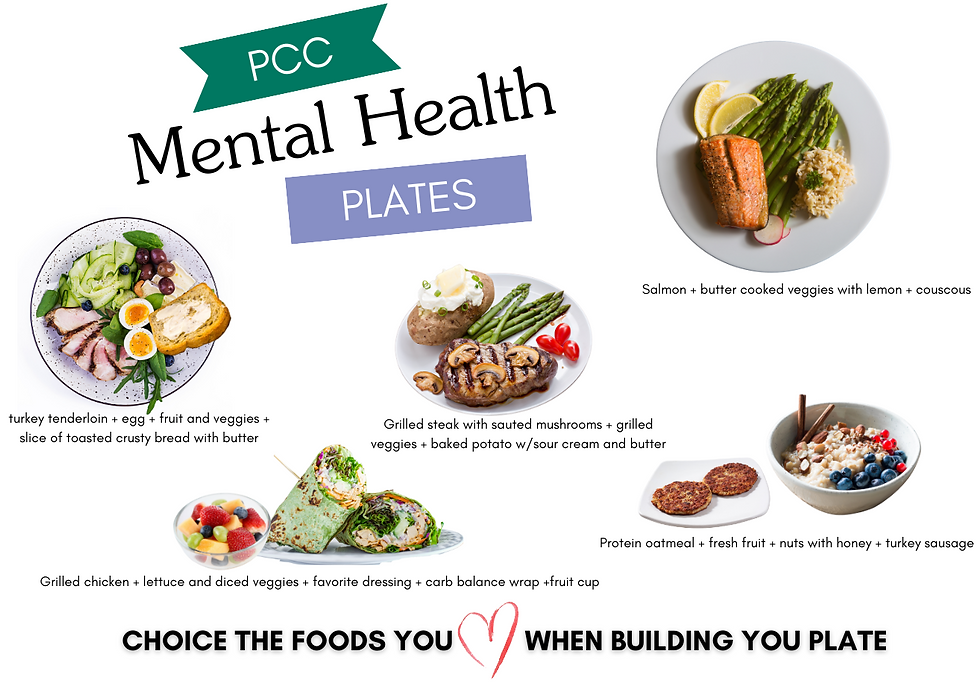Nourishing the Mind: How Nutrition Influences Mental Health
- emilytillsrd
- May 7, 2024
- 5 min read
Updated: Feb 4, 2025
Discover the powerful link between nutrition and mental wellness. From gut health to mindful eating, learn how to nourish your mind for optimal health.

By Erica F Perusse, B.S. Dietetics, Health and Nutrition
The human brain needs a lot of nutrients to work properly and has a high metabolic rate, meaning it needs a lot of energy to function and function optimally. Studies suggest that it uses around 20% of a person's daily calories, roughly 400 - 500 calories daily. The brain is made up of 60% fat and is built on high levels of cholesterol and polyunsaturated fatty acids, such as Omega-3s to form its structure. And the brain's nutritional needs don't even include the nutrients we need for daily activity, physical fitness, or even rest!
Today, we will connect on a topic close to our hearts (and stomachs), the powerful link
between what you eat and how you feel mentally. Yep, we're discussing how your plate
can affect your mood, stress levels, and overall mental wellness. Let's dish out the
details!
Gut Health: Nourishing Your Mind and Body
Did you know that a whopping 90% of your body's serotonin, the happiness hormone, is whipped up right in your gut? Yup, that's right! So, if your gut is adequately fueled, it's
more likely to keep those serotonin levels in check, giving you all the good feels. But
here's the kicker: if your gut's not on its A-game, it might skimp on the serotonin
production, leaving you feeling less than stellar.
That gut-brain connection? It's no joke! What you munch on can totally tweak your gut
microbiome, pulling the strings on your mood, stress levels, and even those pesky
anxiety vibes. So, load up on fiber-packed goodies like fruits, veggies, and whole grains
plus some tasty fermented foods to keep your gut grinning and your mind in zen mode.
Trust me, your gut will thank you, and so will your mood!

Mindful Eating: Nourishing the Mind
Ever experienced that lightning-fast transformation from "happy-go-lucky" to "hangry" in the blink of an eye? Yeah, it's not exactly a joyride, and it can feel like you're a different person. But here's the scoop: mindfulness isn't just about what's on your plate; it's also about keeping it real consistent.
Paying attention to your body's hunger and fullness signals can transform your relationship with food, making mealtime a stress-free zone. Plus, adding mood-boosting foods rich in omega-3 fatty acids, like fish, nuts, and seeds, can keep those good vibes flowing strong. It's all about nourishing your mind, body, and soul in harmony.
Recipe for Mental Wellness and Blood Sugar Control
Let's practice saying goodbye to the highs and lows of blood sugar spikes and crashes. Opting for balanced PCC meals and snacks. What is PCC? It's the Nourished With Emily Method, focusing on protein (P), carb (C), and color (C).
P: Protein-rich foods play a crucial role in supporting our mental health. They provide essential amino acids, which are the building blocks of neurotransmitters like dopamine and serotonin, which are vital for mood regulation and overall mental well-being. Additionally, protein helps stabilize blood sugar levels, providing a steady source of energy to the brain and preventing mood swings and fatigue. Including protein in your diet can help improve cognitive function, focus, and concentration while supporting emotional stability.
C: Carbs are the fuel our brain relies on and its primary energy source. Carbs are broken down with enzymes in our mouth and converted into glucose. It is transported to our brain as fuel to allow it to perform optimally. It's important to choose complex carbohydrates like whole grains, fruits, and vegetables, as they provide sustained energy without causing rapid fluctuations in blood sugar levels. Not to mention, carbohydrates can influence sleep patterns by promoting the release of insulin, which helps facilitate the entry of tryptophan (the precursor to melatonin) into the brain. A good source of carbs equals better sleep and an even better mood.
C: Color comes in all shapes and sizes of fruits and veggies! These mostly colorful foods contain antioxidants, micronutrients, fiber, hydration, and phytonutrients our bodies need. Building your plate with different colors provides a broad spectrum of nutrients and phytochemicals that support mental health and overall well-being. Aim to include a rainbow of fruits and veggies in your meals and snacks to nourish your body and mind.
That combination of protein, healthy fats, whole grains, and fiber can help stabilize blood sugar levels, keeping your energy steady and your mood on point. It will look different for all of us, especially if you're managing diabetes or other health-related concerns. For some, this might mean penciling in that extra snack smack dab between lunch and dinner to keep those blood sugar levels in check and your energy levels up. And hey, for others, it could mean adjusting meal timings or portion sizes to strike that perfect balance. It's all about finding what works best for you and then making minor tweaks to fine-tune your meal schedule.

Building Your Plate for Mental Health
Eat the foods you enjoy and try new things gradually! Here are a few examples of building your plate for mental health.

Hydration: Quenching Your Thirst for Mental Wellness
You know, sometimes the simplest things pack the biggest punch. Take water, for example. Sure, we can go a few weeks without food, but only 3 to 5 days without water! Crazy, right? Considering our bodies are made up of about 60-70% water, it's no wonder staying hydrated is crucial.
But here's the kicker: when we hop on those trendy fad diets or slash calories, our bodies can freak out and start ditching stored water. Not cool, right? So, how much H2O should you be sipping? Well, it's not exactly a cookie-cutter answer. It depends on your current intake, activity level, health concerns, and even the weather! But hold up, don't go guzzling a gallon if you're barely sipping 8 ounces. Chatting with a healthcare provider or your trusty dietitian can help dial in the perfect hydration plan that fits your lifestyle. Stay thirsty, my friends!
Keep this in mind: food isn't just about filling your tank—it's about nourishing your body and mind. When you opt for nutrient-packed goodies and make mindful choices, you're not just feeding your belly but your mental wellness, too. It's all about tuning in to your body's needs and giving it the good stuff it deserves.
Feeling overwhelmed? Hey, we get it. But here's the scoop: you don't have to tackle your nutrition and mental health goals solo. The Nourished with Emily team has got your back, offering support in three simple ways. Because, we're all in this together!
Sources
Lachance, L., & Ramsey, D. (2015). Food, mood, and brain health: implications for the modern clinician. Missouri medicine, 112 (2), 111–115.


Comments